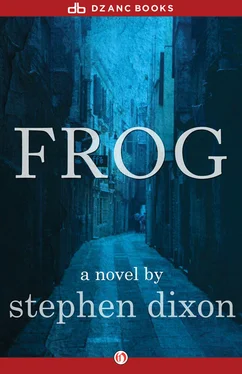Stephen Dixon - Frog
Здесь есть возможность читать онлайн «Stephen Dixon - Frog» весь текст электронной книги совершенно бесплатно (целиком полную версию без сокращений). В некоторых случаях можно слушать аудио, скачать через торрент в формате fb2 и присутствует краткое содержание. Год выпуска: 2013, Издательство: Dzanc Books, Жанр: Современная проза, на английском языке. Описание произведения, (предисловие) а так же отзывы посетителей доступны на портале библиотеки ЛибКат.
- Название:Frog
- Автор:
- Издательство:Dzanc Books
- Жанр:
- Год:2013
- ISBN:нет данных
- Рейтинг книги:5 / 5. Голосов: 1
-
Избранное:Добавить в избранное
- Отзывы:
-
Ваша оценка:
- 100
- 1
- 2
- 3
- 4
- 5
Frog: краткое содержание, описание и аннотация
Предлагаем к чтению аннотацию, описание, краткое содержание или предисловие (зависит от того, что написал сам автор книги «Frog»). Если вы не нашли необходимую информацию о книге — напишите в комментариях, мы постараемся отыскать её.
Frog — читать онлайн бесплатно полную книгу (весь текст) целиком
Ниже представлен текст книги, разбитый по страницам. Система сохранения места последней прочитанной страницы, позволяет с удобством читать онлайн бесплатно книгу «Frog», без необходимости каждый раз заново искать на чём Вы остановились. Поставьте закладку, и сможете в любой момент перейти на страницу, на которой закончили чтение.
Интервал:
Закладка:
Anyway, wine. He brought some. That’s not important. He’s brought wine to just about every dinner party at someone’s home for the last thirty-five years. For a while he was bringing two and a few times three bottles of very good wine to a dinner party. That was when he was a more serious wine drinker and just a bigger drinker and also a lot more flush than he is now. Denise refilling his glass. That’s why he brought up the wine. First she asked. He said thanks and she poured. But what he remembers most about it was that this woman he hardly knew and was already very attracted to would want to pour him another glass. First hers, then his? Doesn’t remember and what’s the difference? Perhaps there’s some significance, and she might have felt “How can I get away with refilling my glass without refilling his?” but “That was nice,” he remembers thinking. “I like it. She’s bold, free-going, present-time, doesn’t see wine as just a formality at dinner and linger over a single glass, and also doesn’t mind a man who drinks, after he’s probably had two or three predinner drinks, a number of glasses of wine and might even be encouraging me to,” though he doesn’t see how he could have assumed all that. She refill the glass of the person on her right? Denise and he sat at the end of the long table and each had a person seated next to him and her. Doesn’t remember, thinks not. Memory he has of it — really just a vague picture — is of that person talking mostly to the person on the other side of him and the one directly across the table next to Howard. Twenty-nine years ago to be exact. He just tallied it. He remembers dates that long ago by the age of his first child. So all he has to do is remember how old Olivia is and he always seems to. She’s twenty-five. They were married almost to the day a year before she was born and they got married three Januaries after the November or December night they met. That would make it twenty-eight years ago to be exact. They had three children, two girls and then a boy. They’re all grown up, out of college or never entered it, professionals or on his or her way to becoming one, but on their own. They had the children quickly, three in four years. That was very tough on Denise in a number of ways. Olivia alone seemed to cry from birth onward for three straight years. Now she’s remarried. Denise is. Actually, Olivia is too. Her first marriage lasted a year. Had a fourth child, Denise did, by her second husband, who already had three by his first two wives. Olivia doesn’t ever want to have a child. “In this world?” she’s said. Her husband’s just about said the same thing. Her second husband. “By war, riots, famine or nuclear accidents, the kid would never live till middle age.” Her first husband wanted desperately to have a child. That was the main reason she divorced him. But he helped her with the children — Howard did — helped Denise — as much as possible in every way he could. That’s what he remembers and also remembers her saying at the time. Later she said he had hardly ever helped her with the children. But there was practically no letup in childwork for both of them for seven or eight years. That wasn’t why Denise divorced him: that he had hardly ever helped her with the children. “Incompatibility,” she said, “principally,” and that it just wasn’t a marriage anymore. To her it wasn’t. To him it still was. Very much still was. Not just that they continued to make love. He continued, she said, but who was she kidding? Even if she wanted to be rid of him at the time, when it came to their lovemaking she continued to be into it as much as he. Let’s face it: sometimes she forgot what she wanted too. Anyway—
Anyway … anyway. “That’s OK,” one of his daughters — Eva — used to say when she was three and did something she thought one of her parents would scold her for. “It’s not so bad.” Always worked. But where was he? In his room. Where he is. Wasn’t his question-an answer too — but that’s OK. Lying in bed. Light on above. Ceiling light. All his clothes on. Shoes on. Only light on and only light in the room and his only room. What he’s come to. That’s OK. Things could improve. Doesn’t really care if they don’t. So? Thinking of Denise. There . Where he was. Called her a year ago. Good. Get right into it. No more whatever they are. Diversions, discursions, ramblings, roundabouts. On Olivia’s birthday called, which is how he remembers it so well: when it was. First Olivia—“Happy birthday, darling”—then, long as he had the receiver in his hand and was thinking family, Denise. That day’s — Olivia’s birthday — coming up in less than a week, so it’s been almost a year exact. Last time he spoke to her but not the last time he heard her voice. Why be cryptic when he knows better? Denise’s. His wife for nineteen-and-a-half years. She said “Nice to hear from you. How are you? How’s work?” Things like that. Finally: “Awful,” he said. Good. No more diversions or detours. “I wish you hadn’t told me that,” she said. “I really don’t, if you’ll excuse me, want to hear how bad off you are in a mental, emotional, professional or even in a physical kind of way.” “Mean, mean. You once wanted to or at least didn’t object.” “One more remark like that and I swear I’m hanging up,” she said. “Please don’t,” he said, “even if I know you’ve every reason to or just about. I’ll come right out with it: I called to hear your voice. If Phil had answered—” “Bill,” she said. “Or your child Annette—” “Anita.” “I would have hung up. No, if Anita had answered I would have said ‘Oh, must have got the wrong number.’ No, I would have said ‘Hello, young lady. Could you put your mommy on please?’ Then when you got on and said hello and then maybe Hello, hello, who is this? Is anyone there?’ I would have hung up. If Bill had got on I would have said nothing. Or just ‘Excuse me, must have got the wrong number,’ and hung up. Then I would have called the next day or two later.” “Why are you telling me all this?” she said. “No, forget I asked.” “I would have called the next day or two later just to hear your voice. That is, if I hadn’t heard it the first time I called, since not only might Anita not have been able to get you but you might not have been home. But if you had got on the first time without Bill or Anita first getting on, I would have just said nothing. I would have just listened to you saying hello or whatever you would have said, but that’s not what I did or what happened. I mean, you did get on, but I’m talking to you. You’re listening to me. I mean, you are still there and perhaps still listening to me?” “Yes,” she said. Anyway—
Anyway, what? Well, that that phone call wasn’t a year ago. It was last week. No, last week he called and only heard her voice. She got on, he heard it and hung up. Not as quick as that but he’ll get into it. Last year he spoke to her on the phone. So last week when he called she must have known, if she remembered what he’d said in his phone call a year ago, who it was who hung up a minute or so after she said “Hello, who is it, anyone there?” a couple of times. She knew. Had to. He called. Anita got on. He said “Hello, little girl, your mother home?” She said “Just a minute please,” and yelled “Mommy.” Denise got on, said hello. He said nothing. She said “Hello, who is it, anyone there?” He heard in the background “Who is it, honey?” That was Bill. Or maybe another man. Maybe Bill isn’t around anymore. Maybe he’s dead, run off or they’ve separated, divorced. Maybe this man was a new lover. Called her honey. Had to be close to her. Or maybe Bill was on a business trip and the lover was with her only for the night or for the entire time Bill was away. No, couldn’t be. She wasn’t like that and would never be. Have a lover over while her husband was away and her daughter was home? No. Maybe he was her new husband. But she said to this man — probably Bill—“I don’t know, nobody’s answering. Maybe it’s a crank. Hasn’t hung up though. Was it a man or a woman, Anita?” and Anita said “A man.” “What did he say to you — exactly, do you remember?” and Anita said “To get you.” “Hello, who is it? Is anyone still there?” she said into the phone. Then “That you, Howard? I’ve a sneaking suspicion it is.” He waited a few seconds, she said nothing else, he hung up. That was last week. A year ago on the phone he told her why he had called. Not only about wanting to hear her voice. About his life. How lonely he was with all their children grown up and gone. With just about nobody around. No woman in his life for years now, years, since she left him, he told her. “Oh please,” she said. “You? No women? With your emotional needs and sexual drive? Come off it. Anyway—”
Читать дальшеИнтервал:
Закладка:
Похожие книги на «Frog»
Представляем Вашему вниманию похожие книги на «Frog» списком для выбора. Мы отобрали схожую по названию и смыслу литературу в надежде предоставить читателям больше вариантов отыскать новые, интересные, ещё непрочитанные произведения.
Обсуждение, отзывы о книге «Frog» и просто собственные мнения читателей. Оставьте ваши комментарии, напишите, что Вы думаете о произведении, его смысле или главных героях. Укажите что конкретно понравилось, а что нет, и почему Вы так считаете.












